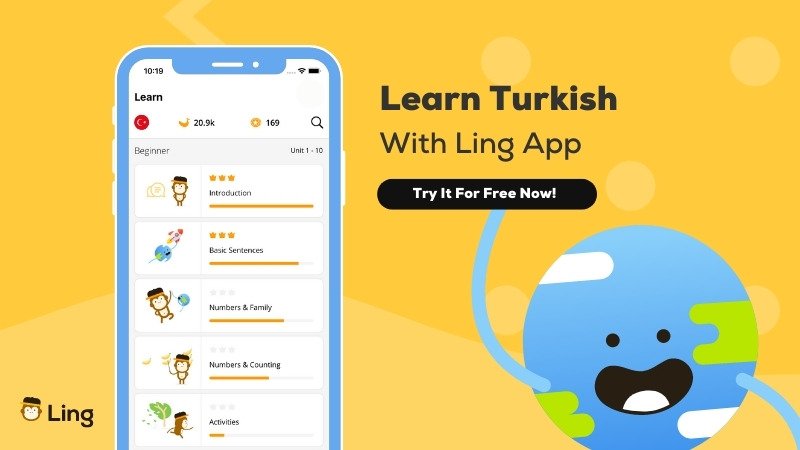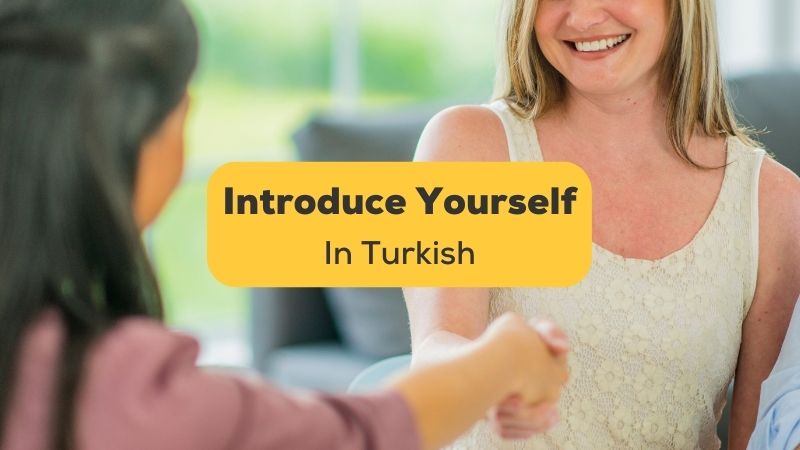It’s important to make a good first impression in Turkey, but do you know how to introduce yourself in Turkish? If the answer is no, no worries! You’ll learn it in 7 easy steps in this blog post.
If you decide to learn Turkish but don’t know where to start, learning how to introduce yourself in Turkish seems like a good start.
Also, if you’re planning a trip to Turkey, you’ll need to introduce yourself a lot. Local people are curious when they see a foreign traveler and want to chat with you to learn about your story, even though they don’t speak English well. In that case, learning Turkish will help you express yourself better.
Let’s get started by learning the must-know Turkish phrases to introduce yourself!
How Can You Introduce Yourself In The Best Way?

The way you introduce yourself influences the first impression you leave. That’s why introducing yourself for the first time is an important thing. You can leave an impressive first impression or an awful one; it’s up to you.
I think it’s a super important question to ask, as not every introduction is made to be remembered. That’s why I wanted to touch upon how to introduce yourself in the best way possible in this part, and here are some tips for you!
Make Eye Contact
Eye contact is a sign that you’re engaged in the conversation. It is the most well-known way to connect with another person and show that you’re focused on them.
Remember To Smile
Throwing a genuine, bright smile when you meet a new person can ultimately change your first impression for good. It’s a sign that you’re happy to meet that person and you have a positive attitude towards them.
Exchange Names
Right after you’ve shared your name, remember to ask for the other person’s name in a polite tone. Once you learn their name, make sure to repeat it at the end of the introduction by saying, “it’s a pleasure to meet you, (let’s say) Kate.”
If you don’t ask for their name in return, it’d be very impolite of you. An introduction should be for both sides, after all.
Offer A Handshake
Most cultures have a form of physical gesture to accompany a greeting. In Turkey, it is usually a handshake. Make sure to keep the handshake brief. According to the rules of etiquette, if it is a woman you’re meeting for the first time, you should expect her to offer her hand first.
Close The Conversation
After both sides introduce themselves, you should end the conversation by stating that you enjoyed making their acquaintance.
If it is a formal occasion, you can say, “Mrs. (their last name), I’m delighted to have met you.” If it was a casual occasion, you could say something like “It was great meeting you, (their first name). Hope to see you around.”
7 Steps To Introduce Yourself In Turkish
Introducing yourself in Turkish is not rocket science, but there are some must-know phrases you should keep in mind. In this blog post, you’ll learn how to say your name, hometown, age, job, etc., in Turkish.
Let’s start with the greeting!
1. Merhaba (Hello)

The greeting is a simple start to a conversation. It’s also common decency to greet people before anything else. You can greet people by saying “merhaba” in the Turkish language. There are other ways to do it, but the most common and neutral greeting word is “merhaba.”
- Merhaba! – Hello! (formal – neutral)
- Selam! – Hi! (informal)
2. Senin adın ne? (What’s Your Name?)
First things first, what’s your name? What do people call you? Who are you? The first thing you should say is your name.
The most common way to ask someone’s name in Turkish is by saying “senin adın ne?” which means what’s your name? You can see the formal and informal versions of this phrase below.
You can basically answer this question by using the phrase “benim adım __” which means my name is__.
- Sizin adınız nedir?- What is your name? (Formal)
- Senin adın ne? – What is your name? (Informal)
- Ben Jane – I’m jane.
- Benim adım Jane. – My name is Jane.
- Benim ismim Jane. – My name is Jane.
Both “ad” and “isim” means name in Turkish.
3. Nerelisin? (Where Are You From?)
So, people are curious about where you come from.
While you can only say the name of your country, there are also different ways to answer this question in Turkish.
Just stick the name of your country inside this phrase “-dan/-den geliyorum” which literally translates to “I come from __” in English.
- Türkiye’den geliyorum. – I’m from Turkey.
- İspanya’dan geliyorum. – I’m from Spain.
You can also answer this question by saying your nationality.
- Amerikalıyım – I’m American.
- Çinliyim – I’m Chinese.
By the way, you can find the country names and nationalities in Turkish here!
4. Kaç Yaşındasın? (How Old Are You?)
Okay, so we’ve learned about your name and country, but how old are you?
While you can answer this question with only the age number, you can also form a complete sentence in the Turkish language.
- Ben 23 (yirmi üç) yaşındayım – I’m 23 years old.
5. Nerede yaşıyorsun? (Where Do You Live?)

Alright, what about now? Where do you live currently? To say where you live, you should use this phrase “-da/-de yaşıyorum.” You can say a city or country name.
- Türkiye’de yaşıyorum. – I live in Turkey.
- İstanbul’da yaşıyorum. – I live in Istanbul.
6. Ne iş yapıyorsun? (What Do You Do For A Living?)
What about your profession? Are you a university student? Yoga teacher? Interior designer? Turkish people love asking about other people’s jobs and trying to guess how much money they make.
You can answer this question by adding the first-person singular suffix to the profession name.
- Öğretmenim. – I’m a teacher.
- Öğrenciyim. – I’m a student.
- Mühendisim. – I’m an engineer.
- Modelim. – I’m a model.
7. Memnun oldum (Nice To Meet You)
After introducing yourself, it’s important to close by saying nice to meet you, which is “memnun oldum” in Turkish. It’s one of the rules of etiquette when meeting someone for the first time.
- Tanıştığımıza memnun oldum. – Nice to meet you.
- Memnun oldum. – Glad to meet you.
- Ben de memnun oldum. Glad to meet you too.
If you want to be able to speak Turkish and be able to introduce yourself, you should use Ling App to learn even more!
Learn Turkish With Ling App!
If you want to learn the Turkish language or other foreign languages, waste no more time and check out the Ling App to start learning something new today!

Ling is a language learning app designed to help all language learners passionate about learning a new language. Ling App consists of various interactive exercises, such as writing and listening exercises, mini quizzes, and an AI chatbot to practice your speaking skills. The Ling App offers you everything to enhance the four primary language skills.
Also, remember to visit Ling’s Turkish blog for new articles about the Turkish language and culture weekly!
So, what are you waiting for? Try Ling for FREE by downloading it from the App Store or Play Store!
Untill next time! Görüşmek üzere!


























